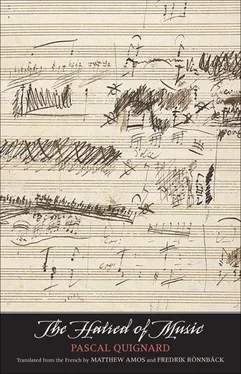One had to wait until the desire to play became irrepressible.
At that moment, the musician would cleanse his hands, light the scented sticks, take hold of the cithara, place it on the rectangular table with his heart exactly facing the fifth mark of the soundboard.
First, with deference, the musician would recall the tune in silence. He would look at the moon. Then he would turn his gaze toward the night.
Only then could the music rise from the heart of the instrument while the musician’s fingers raced and danced.

The European string quartet.
Four men in black, with bowties around their necks, breaking their backs over wooden bows with horsehair, over sheep entrails.

Music is what man owes to time.
More precisely: to the dead interval that produces rhythms.
Concert halls are inveterate caves whose god is time.

Why is hearing the door to what is not of this world? Why has the acoustic universe since the beginning consisted in privileged access to the other world? Is being linked more to time than to space? Is it linked more to language, to music, to night than to the visible and colorful things that the sun reveals each day? Is time the blossoming of being and obeying its dark flower? Is time the aim of being? Music, language, night, and silence its arrows? Death its target?

For the ears, it is the meaning of language ( noèmata , thoughts, phantoms aroused by the voice) that returns to the soul and not the substance of speech. This return is thus a silence to which speech gives way when it rids itself of its flesh. Linguistic attention is a silence in which speech is destroyed and consumed in the form of thought.
Cooked by hearing, language, which is the voice of absent things, is itself transformed into an absent thing — into an elusive phantom that emerges from speech at the moment when its material exterior itself disappears. It is no longer a linguistic sign but a cognitive sensation. Such is the sacrifice of noèsis , which derives from sacrifice (during which the animal is slaughtered and cut up in order to transmit its power, at the same time that this cutting up and distribution organizes and hierarchizes the social order). At least, in linguistic hearing, language spreads out and liberates itself from its physical soundtrack whose domain of application is entirely collective in order to become a silent soundtrack inside every soul it animates.
Because language signifies.
The meaning carried by asemic language (music) is nothing but its very act, that is to say its immediate convocation of blood and breath to itself.
In this sense, linguistic obedience can become individual and the thought that results from it is an extraction from the acoustic.
Thought can become a mute reflection.

To fall silent is first to tear oneself away from the deafness in which we exist with regard to the language within us and in which the speaker is entirely submerged in the social, rhythmic, ritual circulus . Language is never heard while speaking: it is produced before it is heard. The speaker remains with his mouth open in the opening between his exsufflated loss and the acoustic flight forward of the doll or the fetish of his remarks.
The listener remains with his mouth closed: he opens his ears.
In the speaker’s words, language fascinates itself, speaks almost on its own, in any case is barely heard. Kleist’s meditation entitled Monolog . Des Forêts’s story entitled Le Bavard . In locution, it is its own mirage. Speaking is an irretrievable exteriorized confusion. Language thinks the speaker and his thoughts.
The listener hears.
There is no profound listening without the destruction of whoever speaks: he fades before what is communicated, which travels by emerging from him in speech and finally returns in the listener partly because of the elimination of the acoustic source in the air and partly thanks to the silencing-seizing of what is said, which is consumed inside of oneself.
Whoever listens then ceases to be the same man and truly disorganizes himself into thought.
I am speaking of a real form of listening. That is to say of the obaudientia of a real audientia .
When it comes to real forms of listening, I think man knows only two: 1. reading novels, because reading essays suspends neither identity nor mistrust, 2. art music, that is to say the melos composed by those who have been initiated into silent individual language. Two forms of hearing whose silent receptiveness is in position to be totally but also individually affected. Enunciation disappears, reception falters and melts into the source, confusion appears, to which loss of identity bears witness.

When one reads the monk Kenkō’s fragments, when one reads Chateaubriand’s La Vie de Rancé , one does not argue; the soul is conquered; a passivity is born in silence; what is said about the character or the topic or the times is like the attributes of a myth or a novel; one reads beauty; one forgets the argument and seeks only psychic turmoil, noetic aesthesis , and not semantic, thematic, noematic, visual, contemplative knowledge.

Herodotus wrote that women gave up their shame as soon as they took off their dress. Eros took hold of them before their husbands could take the first step toward the embrace. Listeners give up their identity together with orality: they fall silent. For whoever reads a novel and for whoever listens to music, the ground beneath their feet is a falling-silent. The immersion of the diver, mouth closed, in the sea of silence.

But the pinnae of the ears do not fold back on themselves in order to interrupt hearing like the eyelids that are lowered to suspend sight and can be raised in order to restore it.
Plutarch writes: “It is said that physis , endowing us with two ears and one tongue, meant to force us to speak less and listen more.”
Physis “heard” silence before making, out of animals, some humans.
We have one more ear than the mouth has tongue.
Plutarch added, mysteriously, that the ears are comparable to chipped vases.

Whoever writes is this mystery: a speaker who listens.

Writing that obeys.
Obedient: for it submits to an unpredictable and inexorable body.
Possessed by language exactly defines the shaman who falls prey to his prey.

Plutarch reports that Dionysius, at the theater, was enchanted by the virtuosity of a citharede. When the latter had finished the interpretation of his piece, the tyrant of Syracuse approached him and promised him gold, clothing, sumptuous pottery.
The next day, the citharede came looking for Dionysius in his palace. He was received in the great hall. The citharede greeted the tyrant and waited for him to make a sign. But Dionysius waited. When the citharede decided to speak, he modestly asked the prince for the presents he had been promised the evening before after the performance he had given.
Читать дальше













